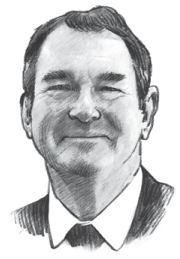 |
|
Nicholas Hope, director of the Stanford Center for International Development |
Nicholas Hope, director of the Stanford Center for International Development, said: "I'd hope, on the economic side, we could see the G20 Summit come out with real proposals to initiate some sort of forward-motion in the trade area, because things have been dormant since the Doha Round more or less collapsed, and regional agreements are not making any significant progress."
Hope, who is head of the center's China research program, attended a forum in Shanghai ahead of the G20 Summit, where he planned to remark on the lack of progress in international trade liberalization, how to improve the global governance structure, and how to get more commitment from G20 members to adopt economic policies that would be conducive to fast growth.
The United States' economy is performing, if not satisfactorily, at least decently, he said. China's growth is slow, but its economy is still perhaps the principal source of global economic momentum. And Europe is in a degree of disarray, he added.
"It's disappointing that so many years after the global financial crisis we haven't moved back to what the macro-economists view as a potential growth path for many countries. In particular, I'm concerned about the failure to promote international trade."
"Combined with the slow growth or negative growth, we also see the emergence of protectionist sentiment, which is particularly worrying, given that both the presidents of Canada and the US have expressed strong views that they don't think some of the initiatives to liberalize trade further should go ahead," Hope said.
The US is not expected to make strong commitments at the G20 Summit in Hangzhou, he added. "They may pay lip service to the idea that we should have more encouragement for international trade and investment, but ahead of the (presidential) election (in November) I don't think they will make any real concrete proposals."
China has a "tremendous" role to play in global economic governance, said Hope, who worked at the World Bank as country director for China before joining Stanford.
"It's one of my principle concerns for this century, and perhaps for the rest of human history, that the size of the global population increases the integration of the world economies."
Hope argued that the measures taken for the good of all sometimes appear to, or in reality, infringe on the individual country's interest. "We're going to be able to succeed as a planet, as a global economy, if the leaders, particularly in major economies, are willing to compromise their interests to some degree in order to secure better overall outcomes."
As the world's second-largest economy, Hope said he believes China is obviously trying hard to provide leadership, at the cost of its own interests to some extent, in trying to curb its dependence on coal.
"China absolutely has a vital role to play not only in providing leadership on the issues, but also in demonstrating willingness to compromise, in ways that may seem detrimental to China's interests, in the interests of the world as a whole," he said.
It would be both productive and positive to do something about heavily indebted countries, he added. "It may be possible to restructure debt over a much longer time and try to give these countries breathing space to get their economies back on track," he said.
